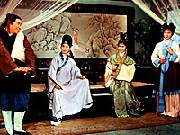|
|
||||
|
|
by Donald Levit  Certain genre films weather badly and years after prove unwatchably hokey; how much more so for those period works originating in other cultures and crossing to these shores for reasons often apart from their innate qualities. Among happy exceptions is The Love Eterne/Liang Shanbo yu Zhu Yingtai, written and directed by Li Han-hsiang, one of the prominent filmmakers in the Shaw Brothers Ltd. stable. Known abroad for martial arts action films, brothers Sir Run-Run and Runme’s prolific Hong Kong-Kowloon operation actually turned out a spectrum from costume epics through comedies and gangster films on to musicals, many aimed at Cantonese on the mainland, in The series-opening, restored-print The Love Eterne comes from a folk legend several times adapted for opera as The Butterfly Lovers and, in fact, is well approached as an Eastern Gilbert and Sullivan Savoy. Its attractive, graceful arm and fan movements substitute for dance per se, so think rather My Fair Lady than most other, more choreographed stage and screen musicals. The last quarter-hour of the film’s hundred-twenty-three minutes is a reversal downer à la Romeo and Juliet, while throughout there is the variation on an Elizabethan convention of boy actors playing girls pretending to be boys, here the cross-gender fanchuan of actresses playing either male characters or else as females disguised as men. Against the stylized artificiality of courtyards, cherry trees, streams and ponds, small arching bridges and rather simple interiors, the dialogue is more sung than spoken. Eastern music strikes dissonant to unaccustomed Western ears, but the recitativi are short and surprisingly agreeable, while subtitles, with whatever accuracy, satisfy along with facial and body movements. We are led to anticipate a happy ending for this human fairy tale, so despite tacked-on souls-become-butterflies in eternal union above the clouds, the real final actions and introduction of supernatural forces are a jarring letdown. However, this does not diminish overall what Ang Lee calls “that feeling of purity and innocence . . . when I saw this movie” (which he picked out for The New York Times’ “Watching Movies” three years ago). It is fourth century With a winning charm that puts to shame Streisand’s stab at something similar, the disguised sixteen-year-old sets off accompanied by personal servant Si-Ju (Li Kun). Beside an appropriately picturesque bridge they come across Liang Shan-bo, a real male scholar but also played by a female (Ivy Ling ), and his female-actress male servant Yin-Xhi (Jen Chieh). With the grace that pervades the entire film, the poorer year-older latter student and the disguised girl pledge to be brothers who will journey and study together, while the two servants are similarly drawn together, humorous parallels promising a four-party comedy of errors. The story does not demean itself with milking the easy obvious difficulties one expects from the situation. To nimble double entendre, this huangmei diao operetta has the two brothers sharing and growing closer. With a The Winter’s Tale time-chorus “slide o’er [three] years,” the seasons change as Ying-tai falls for her companion but stops short each time she would clearly spell out the truth. Only after an urgent summons home -- for betrothal to rich, beastly Ma Wen-cai, it turns out -- is her secret revealed, through a token of a jade bracelet which will subsequently be paired with a bloodied embroidered hanky, and kindly teacher’s wife, Mrs. Meng (Kao Pao-shu). Reflecting the Shaws’ taste for Chinese literary and theatrical classicism, Liang is cast in the mold of the shusheng type, charming but emotionally weak and ineffective, self-proclaimed “dumb as an ox,” while his “brother,” the woman who loves him and is stronger, is a young lady of distinguished family. This simplified footnote may be of interest, and the above parallels with the English stage merely suggested as one way to enter The Love Eterne through a more familiar door. Nevertheless, no outside additions at all are needed, for the film wears its four decades well and justifies its place as one of its studio’s biggest grossing and most consistently revived films. (Released by Shaw Brothers; not rated by MPAA.) |
||
|
© 2024 - ReelTalk Movie Reviews Website designed by Dot Pitch Studios, LLC |



